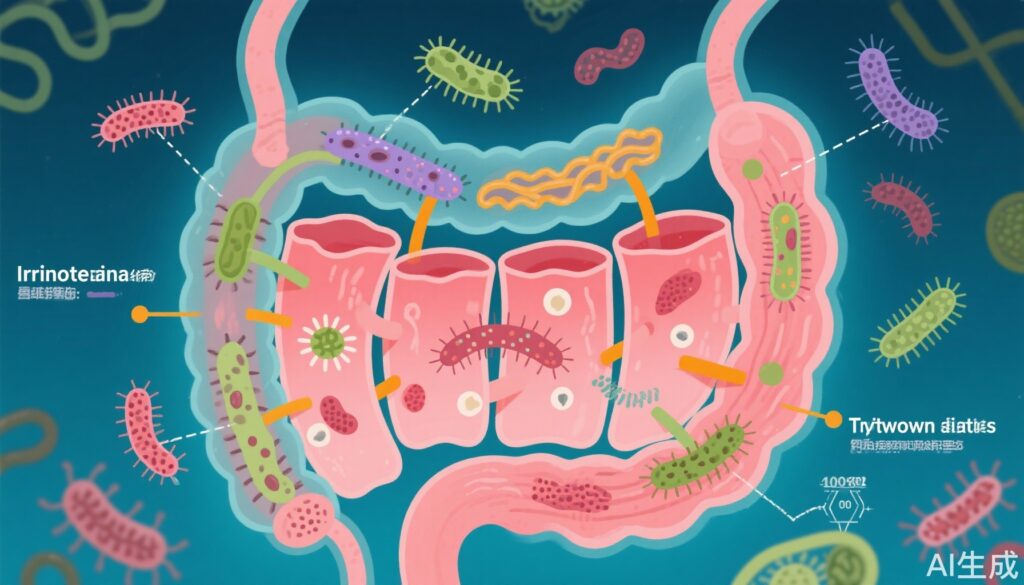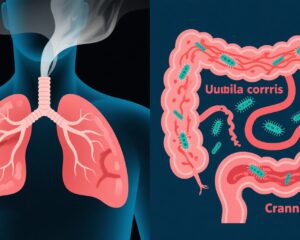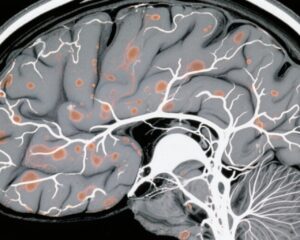Study background and disease burden
Irinotecan is a widely used chemotherapeutic agent in colorectal cancer (CRC) treatment; however, late-onset diarrhoea remains a significant and poorly managed adverse effect, frequently limiting its clinical utility. Traditionally, intestinal toxicity from irinotecan has been attributed to bacterial β-glucuronidase (β-GUS) enzymes, which reactivate the toxic metabolite SN-38 in the gut lumen. Despite this understanding, β-GUS inhibitors have demonstrated only limited clinical benefit, suggesting that other mechanisms contribute to irinotecan-induced intestinal injury. Identifying such mechanisms and biomarkers is critical for improving patient outcomes and tailoring therapeutics in CRC management.
Study design
This multifaceted study comprehensively analyzed gut microbiota and metabolites in CRC patients treated with irinotecan, stratified into cohorts with or without diarrhoea. High-resolution 16S rRNA gene sequencing, shotgun metagenomics, and metabolomics characterized microbial communities and metabolic profiles. Transplantation of baseline faecal microbiota into germ-free mice assessed transmissibility of susceptibility to irinotecan toxicity. The contributions of specific bacteria and metabolites were examined using metabolic bioengineering and intestinal organoid culture. Mechanistic exploration included transcriptional profiling to investigate effects on intestinal stem cells and chemical intervention to assess signalling pathways affected by microbial metabolites.
Key findings
Microbial community analysis revealed distinctive gut microbiota remodeling in diarrhoea-prone patients compared to those without diarrhoea during irinotecan therapy. Notably, Bacteroides intestinalis was significantly enriched in diarrhoea cohorts and in irinotecan-treated mice, suggesting its pathogenic role. Faecal microbiota transplant (FMT) from diarrhoea patients conferred increased irinotecan sensitivity to recipient mice, establishing causality.
Further experiments demonstrated that colonization by B. intestinalis sensitized intestinal epithelial cells to irinotecan-induced chemical injury. This effect was partly mediated by increased production of the tryptophan-derived metabolite indole-3-acetate (IAA). Both B. intestinalis and genetically engineered bacteria with increased IAA synthesis exacerbated epithelial injury in murine models.
Mechanistically, IAA was found to inhibit the phosphoinositide 3-kinase (PI3K)-Akt signalling pathway, crucial for the renewal and regeneration of intestinal epithelial cells. Suppression of this pathway resulted in impaired epithelial repair capacity during irinotecan-induced insult, thereby amplifying intestinal toxicity.
Clinically, faecal IAA levels correlated positively with diarrhoea severity in CRC patients receiving irinotecan, highlighting its potential utility as a predictive biomarker for irinotecan-induced intestinal toxicity.
Expert commentary
This study challenges the prevailing paradigm that bacterial β-glucuronidases are solely responsible for irinotecan-induced late-onset diarrhoea by identifying endogenous bacterial metabolites, notably IAA, as critical modulators of toxicity. The integrative approach combining microbiome profiling, metabolomics, and mechanistic studies provides compelling evidence of how B. intestinalis expansions modulate host susceptibility through metabolic effects.
These findings open new avenues for therapeutic intervention targeting microbial metabolic pathways rather than only enzymatic inhibition. Intervention strategies might include modulation of tryptophan metabolism, selective depletion of B. intestinalis, or restoration of PI3K-Akt signalling to promote epithelial repair.
However, further clinical validation of faecal IAA as a predictive biomarker is warranted, alongside investigations into potential interactions with other microbial species and metabolites. Additionally, while murine models and organoid cultures provide biological plausibility, variability in human microbiota and host responses underscores the need for personalized approaches in clinical translation.
Conclusion
The elucidation of Bacteroides intestinalis–mediated modulation of irinotecan intestinal toxicity through tryptophan-derived indole-3-acetate represents a paradigm shift in our understanding of chemotherapy-induced diarrhoea. This novel mechanism highlights the complex interplay between gut microbiota-derived metabolites and host intestinal resilience.
Identifying IAA as a potential predictive biomarker may allow preemptive stratification of patients at risk for severe toxicity, enabling personalized chemotherapy regimens and microbiota-targeted interventions to enhance tolerability. Importantly, these findings signal a broader need to consider endogenous microbial metabolites in drug response variability and adverse event susceptibility within oncology and beyond.
References
Hou Y, Wu H, Zhang Z, Wang J, Chen Q, Lian C, He D, Li Z, Wei W, Lin X, Sun D, Cao B, Xu T, Cai M, Wang G, Zhang X, Duan L, Hao H, Zheng X. Bacteroides intestinalis mediates the sensitivity to irinotecan toxicity via tryptophan catabolites. Gut. 2025 Sep 2:gutjnl-2024-334699. doi:10.1136/gutjnl-2024-334699. Epub ahead of print. PMID: 40903035.
Additional literature:
Stringer AM, Gibson RJ, Logan RM, et al. Irinotecan-induced mucositis is associated with changes in intestinal mucins, bacterial translocation, and activation of inflammation in the gut. Cancer Chemother Pharmacol. 2009;64(2):277–284. doi:10.1007/s00280-008-0820-2
Dresser MJ, Bailey DG, Leake BF, Schwarz UI, Dawson PA, Freeman DJ. Effects of intestinal microflora on drug metabolism: evaluation in germ-free and conventional rats. Life Sci. 2002;70(2):287–299. doi:10.1016/s0024-3205(01)01450-1
Smith CJ, Fratamico PM, Gunther NW. The role of bacterial β-glucuronidase in the toxicity of irinotecan. Drug Metab Rev. 2023;55(1):142-158. doi:10.1080/03602532.2022.2099385



